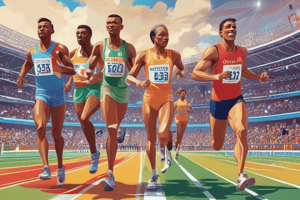Podcast
Questions and Answers
What is the main purpose of the Olympic Games?
What is the main purpose of the Olympic Games?
- To promote tourism in the host country
- To provide a platform for athletes to gain international recognition
- To increase global awareness of different sports
- To identify the most exceptional athletes from an international pool of competitors (correct)
What do the five colors of the Olympic rings represent?
What do the five colors of the Olympic rings represent?
- The five most popular sports in the Olympics
- The five colors of the flags of the founder countries
- The five participating countries with the most medals
- The five major continents of the world (correct)
What does the Olympic flame symbolize?
What does the Olympic flame symbolize?
- The passion and dedication of athletes
- The unity and solidarity of participating nations
- The spirit of competition and victory
- The light of spirit, knowledge, and life (correct)
Where is the Olympic torch lit?
Where is the Olympic torch lit?
What happens to the Olympic flame on the final day of the torch relay?
What happens to the Olympic flame on the final day of the torch relay?
What was awarded to the Olympic champion in Ancient Greece?
What was awarded to the Olympic champion in Ancient Greece?
Why was a sacred truce declared before the commencement of the games in Ancient Greece?
Why was a sacred truce declared before the commencement of the games in Ancient Greece?
Who was permitted to attend the ancient Olympics?
Who was permitted to attend the ancient Olympics?
Who prohibited the original ancient Olympics in 393 A.D.?
Who prohibited the original ancient Olympics in 393 A.D.?
When were women first allowed to participate in the Olympics?
When were women first allowed to participate in the Olympics?
Flashcards are hidden until you start studying
Study Notes
What are the Olympics?
- The Olympics is an international event where athletes from around the world compete in their chosen sports.
- The event provides an opportunity to identify the most exceptional athletes from a global pool of competitors.
Olympic Symbols
- The Olympic Flag:
- The Olympic rings were first produced in 1913, designed by Baron Pierre de Coubertin.
- The five colors (along with the white backdrop) represent the colors found on the flags of all participating nations.
- The overlaps symbolize international cooperation and unity among athletes from around the world.
- The five-colored rings represent the five inhabited continents of the world: Africa, North & South America, Asia, Europe, and Oceania.
The Olympic Torch
- The Olympic flame symbolizes the light of spirit, knowledge, and life.
- The tradition of the Olympic torch began in 1936.
- The torch is lit at the site of the ancient games in Olympia, Greece, and then taken to the host country.
- The torch travels around the country or continent in a relay race, with different people holding it.
Olive Leaf Crown
- In Ancient Greece, the Olympic champion received an olive wreath as a crown.
- The wreath was taken from a branch of an olive tree and formed into a circle or horseshoe shape.
History of the Olympics
- The modern Olympics are directly connected to an event in Greece almost 3,000 years ago, in 776 B.C.
- The Olympics originally served as an important religious festival to honor Zeus, the king of the gods.
- A sacred truce was declared one month before the commencement of the games, allowing individuals to travel safely.
- Only men, boys, and unmarried girls were permitted to attend the ancient Olympics.
- Married women were not allowed to attend, but had a festival at Olympia, known as the Heraia, which was held every four years.
- The Roman Emperor Theodosius I prohibited the original ancient Olympics in 393 A.D.
- The first modern Olympics were started in Athens, Greece, 1500 years later, with 13 nations competing in several sports.
- Initially, only men were eligible to participate, with women being barred from joining until after 1900.
Studying That Suits You
Use AI to generate personalized quizzes and flashcards to suit your learning preferences.




